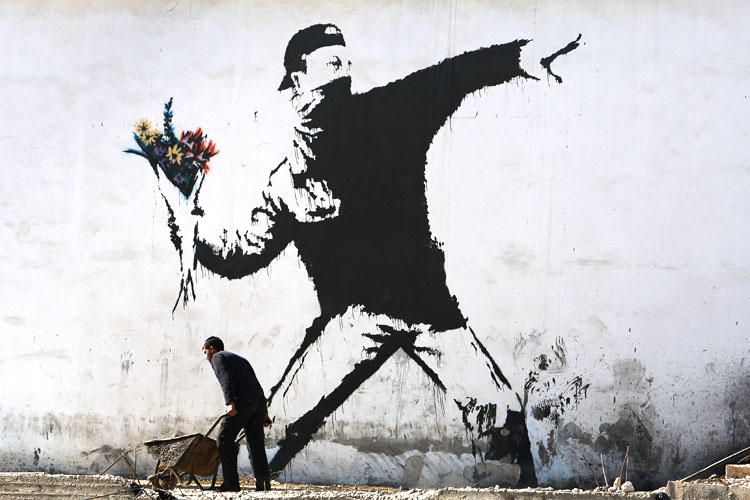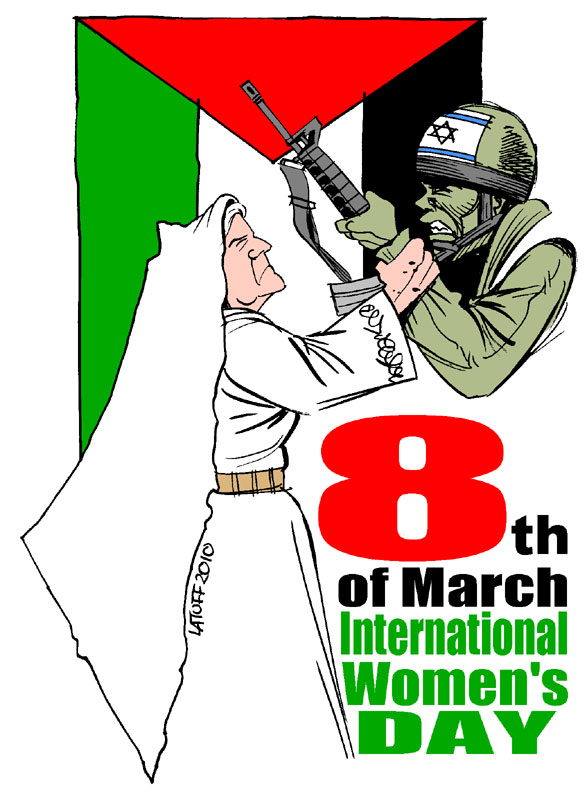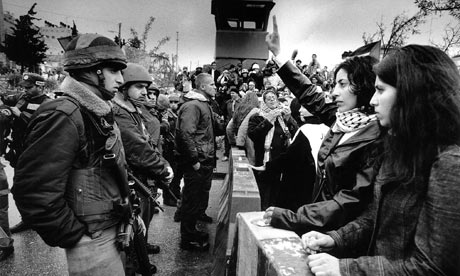
EDITOR: Some sane signs amidst the media glitz and medness
For Haaretz to publish a call for Israel to speak with Hamas, at the very moment of preapring another war on Gaza while talking ‘peace’ with the US, however mild the article may be, is not a usual practice in country where the mere name of Hamas is used to frighten the public into docile submission. Let us hope some more sane voices may follow.
Israel must talk to Hamas before it’s too late: Haaretz
By David Zonsheine
Israel must talk to Hamas. Not secretly. Not indirectly. Not for a politician to rehabilitate himself on the way to taking over the leadership of a party, as Kadima’s Shaul Mofaz tried to do, but openly and seriously. Just as the United States regularly talks to the Israeli opposition, Israel should maintain a dialogue with the Palestinian opposition. The dialogue should cover all core issues including a final settlement.
It’s not a simple matter, of course. There is agreement across the political spectrum to reduce the debate to a demonization of Hamas, dwelling on the organization’s external attributes as perceived by Israel – religious, extremist and desiring all the territory between the river and the sea. This debate does not focus on the Israeli interest. We should be asking ourselves the following questions: Is it worthwhile to speak with Hamas? What are our reasons for not talking to them? Is boycotting them linked to an erroneous preconception?
Israel rigorously insists that Hamas is not a partner and that our partner is Fatah, headed by Palestinian President Mahmoud Abbas. But negotiations with Fatah have been going on for nearly two decades, and Prime Minister Benjamin Netanyahu’s declaration that he accepts the principle of two states for two peoples looks like just another trick to postpone the demise of the current negotiation process.
In 2004, the Israeli government decided that Yasser Arafat was not relevant. Abbas, Israel’s leaders have said, is weak. At the same time, Israel has for years been doing all it can to weaken the Palestinian Authority. That way, it will be possible to prove yet again that although “we have to talk, there’s no one you can close a deal with.” Even if an agreement is signed under American pressure, the PA will not be able to implement it because more than half the Palestinians don’t accept its authority. This is why the refusal to speak with Hamas is pointless. It is no more than a continuation of avoiding talking to the Palestinians by other means.
Hamas’ rule in Gaza is the outcome of despair with the Fatah leadership. The deterioration of the situation in Gaza after the ongoing failure of negotiations and the total dependence on Israel for receiving basic needs intensify the despair and extremism. (And no one is talking about the right to free movement, to go abroad to study.) Even today, there are groups resisting Hamas that resemble Al-Qaida. We can drag things out as much as we want, but we have to admit that the notion that time is on our side is baseless. The people who led Abbas to consider resigning and who refuse to talk to Hamas will find themselves in five years with a partner who reports to Osama bin Laden.
Nothing is possible without Gilad Shalit. People may say that the fate of a country cannot be dependent on what happens to one abducted soldier. There is no greater mistake. The abandonment of Shalit is symptomatic of Zionism’s failure, the elevation of pride over wisdom and tactics over strategy. It’s the denial of the sanctity of life and redeeming prisoners, values that are at the heart and soul of the nation.
Precisely here, the soft underbelly of public opinion, it would be possible to makes progress on the delicate matter of contacts with Hamas. More than 7,000 Palestinians are being held prisoner in Israel. There is one Israeli prisoner in Palestine. The suffering of both sides, and with it the tremendous joy that a prisoner exchange would produce, can and should be the lever for a stepped-up conciliation process.
For years Israel and its citizens have been paying the price of choosing solutions that were appropriate for the last war. Hiding our head in the sand at such a critical stage is dangerous. We have to declare our readiness to speak with the Palestinian opposition, immediately.
The writer is a joint founder of an initiative seeking direct and open talks with Hamas.

Possibilities of war: Iran: Al Ahram Weekly
Despite how alarming the prospect of a nuclear Iran might be to Washington, enhancing sanctions or authorising pre-emptive strikes could lead to an all-out war the US might lose, writes Azmi Bishara
The Obama administration’s reappointment of the Bush administration’s secretary of defence, Robert Gates, reflects the growing involvement of the US military establishment in decision-making processes on matters of war and peace, and hence in US foreign policy in general. The primary catalyst in this development has been the dismal results of the wars in Iraq and Afghanistan leading to attempts to reform the military establishment’s modus operandi, which isn’t directly affected by elections, a couple of years before the end of Bush’s tenure. The new programming was scripted to a considerable extent in the Baker- Hamilton Report, submitted to Bush in December 2006. The most important recommendations of this report were, first, its call for a dialogue with countries neighbouring Iraq, including Syria and Iran, in order to persuade them to help promote stability in order to extricate the US from the Iraqi quagmire it created after having invaded that country and demolished its existing governing infrastructures, and second its call to renew efforts towards a political solution to the Palestinian cause, which is to say to revive the so-called “peace process”.
Against this backdrop, the appointment of Gates as secretary of defence, instead of Rumsfeld, was a manifestation of the military establishment’s rejection of the latter and of the neoconservatives’ adventurism. Gates is now the military establishment’s man in the White House and his influence has increased under Obama. He epitomises that conjunction between the refusal to allow Iran to arm itself with nuclear weapons and the desire to avert an all-out war with Iran. This is the current position of the establishment in the West, regardless of the Tony Blair-like histrionics that only a handful of Arab officials buy.
Washington’s refusal of a nuclear Iran has its roots in its relations with Tehran since the Islamic Revolution. Its position is based on both rational and irrational reasons, even from the American perspective, and these are precisely the reasons that compel a regime that feels itself under perpetual threat from the US, which has not recognised it until today, to contemplate possessing a nuclear weapon for deterrent purposes. The mutual antagonism between Washington and Tehran is fed by the former’s declared and applied intent to overthrow the Iranian regime and by the latter’s refusal to accept US hegemony and its consequences in the Middle East. However, the more immediate cause for hostility is the Israeli attitude towards Iran, even in the reformist era, versus the Iranian attitude towards Israel.
It is this factor that accounts for why the tenor of Iranian-US relations has remained unchanged even after much has changed in both countries. It is what fuels that dynamo that whirs tirelessly in the international domain to impose sanctions and to keep the Iranian question a top priority on the global agenda. Israel is the most active country in this dynamo. It is the party that most clearly and persistently urges the use of all means to prevent Iran from attaining the ability to produce its own nuclear weapon, and it is the most adamant about keeping the military option open, if only in theory, in the game of tug-of-war with Iran. The Israeli lobby in Congress and the White House is steering the campaign against Iran. Its success in this regard was crowned with the appointment of Dennis Ross as the White House’s advisor and special envoy on matters pertaining to Iran. Western leaders, in general, can come up with no other justification for their opposition to the Iranian nuclear programme than their anxiety over “its potential threat to Israel’s security and existence”.
While European officials were discussing the question of tougher sanctions on Iran, Israel marked the 61st anniversary of the liberation of Auschwitz with even louder than the previous year’s commemorations. In the process, teams of Israeli officials were deployed in every European capital to mount podiums, wag their fingers and deliver lectures on the relationship between the Nazi Holocaust and the Iranian position on the existence of Israel. Needless to say, the wiles and ruses of political exploitation know no bounds. Few are the arenas that have not come under pressure from Israel and the US to prevent Iran from arming itself and to tighten sanctions. The campaign extends across the whole of Europe, Russia, China, India, the Arab world and even Africa. No field of industry, banking and even the media has escaped being turned into a means for weakening and surrounding Iran. Even the Lebanese/Syrian front, from the Israeli perspective, has been subordinated to calculations pertaining to the primary front against Tehran. The existential threat comes from there, according to the current Israeli thinking, and the chief strategic threat is Iran’s missiles with regard to which Israelis are keeping very close watch on range, accuracy, the type of warhead they can carry, and their destructive power.
In the distant past, the Arab nationalist regimes of the 1960s constituted the real threat. They were existentially antithetical to Israel and applied their energies against it on all fronts. Today, the visible danger resides in a hostile regime that is ideologically opposed to Israel, that has given no hint of an inclination to reach an understanding, and that possesses advanced missilery. The Arabs, of course, remain the existential antithesis in the long run, but they are unorganised and they are not collectively represented by a sovereign state or even several separate states.
Binyamin Netanyahu has taken this thinking so far as to dub Iran the “new Amalek” ( Haaretz, 18 February 2010). The reference is to the Biblical Amalekites who occasioned the first divinely ordained genocide in history when the Old Testament Yahweh commanded the Israelites to destroy them totally, sparing no one, including women, children and even their livestock. Of course, such a thing is not possible in our modern day and age. However, apparently it is possible for a secular prime minister of a “democratic” state to hurl an allusion to this blood-steeped legacy at his contemporary political enemies without raising the eyebrows of the civilised world, where the current bent of literature, arts and dialogue conferences of every sorts is to heap scorn and derision on Ahmadinejad, and without stirring The New York Times into devoting even a small editorial to this dangerous and provocative indulgence in religious imagery.
Turning to the other half of Washington’s dilemma, its reluctance to start a full-fledged war against Iran resides in its anxieties over the fallout from such a war on the rest of the region, inclusive of Iraq, all the more so given that the repercussions are impossible to predict with any degree of accuracy. It also has to do with doubts over whether the US and its allies could sustain the costs of a war, and with the lack of any volunteers to side with the US in such a war in spite of the many parties prodding and plotting for a military showdown. To further aggravate this factor, the US remains mired in Iraq and Afghanistan, where resistance movements remain strong, and it is doubtful whether it could stretch its forces to other fronts.
It should be mentioned here that Arab countries could be certain of preventing a war, for there could not be a war without their approval, whereas their approval alone is not sufficient to make a war. Evidently, they have opted for the less certain path. This is also the place to register a reminder that if the Arabs had systematically opposed the American invasion of Iraq they would have prevented that war.
Of course, the Obama administration has political considerations for avoiding combat against Iran. Obama was elected largely on the basis of his pledge to put an end to wars begun by his predecessor. He was not elected to start new wars. If he has yet to score any major inroads towards the fulfilment of that pledge, imagine the political risks he would incur if he plunged his country into another war, especially one that would be so unpredictable.
There are, nonetheless, the seeds of a different approach to the Iranian question, but they are unlikely to find fertile ground in view of the hold the Israeli perspective has over US strategy for the region. The alternative viewpoint is to learn to cope with the idea of Iranian nuclear capacity; it would not be the end of the world. Iran is better organised and more institutionalised than Pakistan. Of course, there would have to be comprehensive understandings, but these are reachable with a state that is developing a nationalist pragmatism that seeks to translate economic, political and strategic advantages into regional and international status. No one has anything to gain if this power is built under boycott, and certainly those who violate the boycott do not do so free of charge: some receive payment in material goods or cash (Russia), others in reduced oil prices (China), and others in commercial, financial and real estate returns (Dubai). So, according to this point of view, what’s wrong with containing Iran within a framework that acknowledges its standing? In return, Iran would accept conditions that not only meet the approval of the US but also of a large segment of Iranian public opinion that wants the Iranian government to give priority to the needs of its citizens and the country (a policy of “Iran first” one might say).
In fact, Iran has come a long way in this direction. The development is particularly apparent in its relations with neighbouring Arab countries in which it is constantly trying to turn local sectarian affiliation into political affiliation to Tehran (“Iran first”). However, the Shia Islamist ideology on which the Iranian regime is founded restricts the tendency towards state pragmatism, for not only does it highlight what separates Iran from its surroundings it also underscores what it has in common with it, namely Islam and antagonism towards Israel. Still, in the absence of the abovementioned alternative, the US position remains caught between its rejection of a nuclear Iran and its desire to avoid an all-out war.
Within this framework, both sides have a margin of manoeuvrability. The US-Israeli margin ranges from pressing for harsher sanctions (covering economic, commercial and financial activities, as well as transportation and communications) to calculated raids on specific targets (along the lines of the Israeli bombing of the Iraqi nuclear reactor or its “pre-emptive” strike against Deir Al-Zor). Somewhere in the middle lie intelligence operations, such as supporting armed insurgents in Iranian border regions, and — more recently on the American agenda — supporting the new Iranian opposition. In the not so distant past, US intelligence efforts focussed on backing the conventional opposition made up of members and supporters of the ancien régime. However, the US could not pass up the window of opportunity presented by the front that rallied behind the rejection of the Ahmadinejad approach and the results of last June’s presidential elections. This opposition is deeper, broader and morally weightier than the conventional opposition, for which reason it will obtain unconventional assistance, both directly and indirectly.
The Iranian margin of manoeuvrability covers warding off harsher sanctions for as long as possible, announcing conciliatory initiatives — especially at times when it makes another breakthrough in uranium enrichment — and sustaining good relations with countries that are more concerned about promoting their economic interests than about pleasing the US, such as China and Russia. Even a country such as India, which has entered the US-Israeli alliance (largely because of the Arabs and Pakistan) and has more reasons than China to value this alliance, has strategic reasons for not jeopardising its relationship with Iran. In addition to such concerns as a shared position towards Afghanistan, for example, India refines some 40 per cent of the gasoline that is imported into Iran. Turning off the taps to refined gas is the furthest the US is contemplating on going in terms of “effective sanctions” and this step it would save for last. At that point Washington would not only have to pressure China, it would have twist India’s arm too. However, its ability to do so has gradually dwindled with respect to India because of the US’s declining fortunes in its war against the Taliban which, in my opinion, it will ultimately lose, and with respect to China because of the repercussions of the global financial crisis.
In calculating the limits of military confrontation in that space between the desire to avoid comprehensive engagement and the rejection of a nuclear Iran it is best to exclude actions that could lead to a full-scale war, even if that is not their initial nature or intent. For example, tactical raids are theoretically possible as an upper threshold of engagement, yet one side or the other could take such an action as an act of war and respond accordingly, on the basis of the reasoning that that is what war is. Thus, attacks against certain locations in Iran could escalate into a full-scale war, but the same might apply to a cut-off of imports of refined gas. Much would depend on the Iranian reaction. If Tehran saw this as grounds for retaliatory skirmishes in the Straits of Hormuz, would the US not respond to the challenge? In other words, might not the imposition of certain types of sanctions feasibly degenerate into all-out war?
While the US, now, seems to be treading these waters with care, it will still continue its gradual push no notch up sanctions in a way that will guarantee a favourable response from the countries that count. It will simultaneously build on the development of the Iranian opposition. This is now Iran’s fundamental problem and it should compel Tehran to deal more seriously with the dialectic of citizenship and the official ideology of the state. The Soviet Union, the countries of Eastern Europe and China have passed through such a phase. This is not the place to elaborate on those battles. However, the civil rights camp, as rightful as its demands are, continues to regard foreign policy and ideology as the cause of its tragedies, although there is not necessarily a connection between the two, apart from the regime’s attempts to use ideology and the banner of solidarity with the oppressed as a pretext for abusing the rights of citizens, restricting freedoms, and nurturing and protecting corruption among the ruling classes. I stress “as a pretext”. The oppressed and those who side with them, wherever they might be in the world, are not to blame for the mismanagement of the kolkhozy, domestic repression or the failure of five-year plans. In addition to people’s tendency to blame an ideology that had become totally devoid of substance at the time of the state’s collapse, and hence an easy target, the opposing camp, too, plays on ideology in its propaganda campaigns against its adversary and in marketing itself. Some self-appointed spokesmen for the oppressed do this in the course of their praise for domestic policies in totalitarian states. Iran faces a dialectic of this sort. It will have to come to terms with it in order to strengthen its resilience against outside pressures.





